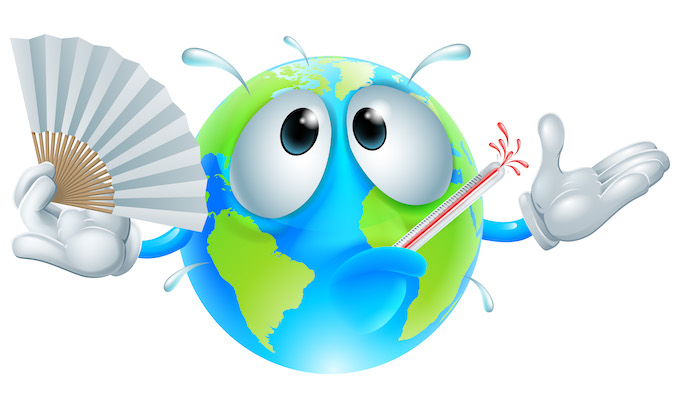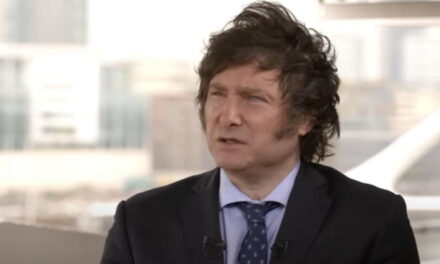Five years to the day after world leaders signed the Paris Agreement, President Joe Biden is hosting a summit on Thursday with fellow heads of state to stimulate efforts to tackle climate change.
The two-day virtual event is set to begin on Thursday, Earth Day, with the leaders of some 40 countries among the world’s largest economies — including Chinese President Xi Jinping, Japanese Prime Minister Yoshihide Suga, German Chancellor Angela Merkel and Indian Prime Minister Narendra Modi.
The White House said Biden plans to announce an “ambitious” 2030 emissions target ahead of the meeting, possibly Wednesday, which comes as the new administration attempts to reassert itself as a world leader in efforts to limit global warming to 1.5 degrees Celsius above pre-industrial levels.
Former U.S. Secretary of State John Kerry joined some 195 signatories to the pact during a ceremony in New York City on April 22, 2016. But the framework was little more than a year old when the next administration delivered a notice to the United Nations announcing the United States’ withdrawal.
Former President Donald Trump called the agreement “unfair” to the United States, saying it undermined the U.S. economy and was a bad deal for American workers.
On the first day of his administration in January, though, Biden immediately sought to reverse Trump’s efforts to downplay climate change and announced his intention to rejoin the pact.
John Podesta, founder of the Center for American Progress, said this week’s climate summit will be Biden’s chance to undo some of the Trump-era environmental policies.
“[Biden] comes into this summit with the need to repair U.S. credibility after four years of a president who denied the existence of climate change and did everything in his power to undermine the programs in the U.S. that were attempting to reduce emissions,” Podesta said, according to Vox.
David Waskow, International Climate Initiative director at the World Resources Institute, told Voice of America that Biden could set the standard by which other countries will act with his announcement of a new emissions target.
“Certainly China is looking to see what the United States is going to do,” he said. “We know that some of these other countries — Japan, South Korea, Canada, India — are watching to see how the United States will move.”
The White House said the summit will include discussions about how to utilize public- and private-sector finance, and technology to drive the transition to net-zero emissions, as well as the economic benefits of climate action.
The summit on Thursday follows a report by the International Energy Agency this week that says global carbon emissions could increase by nearly 5% in 2021, wiping out most of the decline that was seen in 2020 due to COVID-19-related shutdowns. The IEA said in its Global Energy Review 2021 that if the carbon increases continue as projected, this year would see the greatest growth of emissions since 2010 and would be the second-largest rise in history.
A World Meteorological Organization report earlier this week said the pandemic-related shutdowns failed to slow down the drivers of climate change.
“This report shows that we have no time to waste,” United Nations Secretary-General António Guterres said.
“Countries need to commit to net zero emissions by 2050. They need to submit … ambitious national climate plans that will collectively cut global emissions by 45% compared to 2010 levels by 2030. And they need to act now to protect people against the disastrous effects of climate change.”
Copyright 2021 United Press International, Inc. (UPI). Any reproduction, republication, redistribution and/or modification of any UPI content is expressly prohibited without UPI’s prior written consent.
—-
This content is published through a licensing agreement with Acquire Media using its NewsEdge technology.



















climate change is the new term for communism.
It really doesn’t matter what the controlling Democrat Party says, it is 99% Lies, Cons and Deceptions.
The Dishonorable, Democrat Party in the U.S. game plan is to lie, cheat and steal elections in order to control the American people and bring American commerce and economy to its knees.
Then access power and retain it by any means available –
no matter the costs to the people, the government or the nation.
99%? YOU are missing the last 1%.. EVERY DAMN THING they say is lies, deception and traitorous to this nation!
Everyone needs a demented leader to make major costly decisions that will affect your life for a long time……..what could go wrong?
Yep, Joe will cut all carbon emissions in the world, when China and India do not have to abide by pollution controls. Of course with all of this so called clean energy, we will be like communist California, where they cannot use their air conditioners in the summer and cannot use their heat in the winter, because they cannot produce enough clean energy. I live in Michigan, my natural gas furnace and my water heater does not work without electricity, so when I am not provided with electricity, because the “green new deal” cannot supply enough electricity, I should just freeze to death in the winter.
Every one saw just how borked over, texas was, cause of that super freeze, that neutered their wind and solar energy.. IMO THAT IS WHAT THEY WANT for the rest of the nation…
There is no leadership in anything he does, there is the consensus of the leftist radical string pullers jerking his chain and making him dance. All that will happen is he will agree to all the hairbrained schemes presented without debate, a leftist tradition, and taken as truth.
Can any of these fools who think that they are gods, tell us what the optimal temperature of the earth is? “Fool’s and blind!”
I don’t trust Biden nor Kerry to do what’s “right” for the USA
WHEN have they ever done anything right, for this nation!?!?!?!?!
IF global warming (climate charge) is true, explain why it snowed at my house this week and why there was a new record low temp yesterday.
Climate change is a fraud…a lie…a departure from reality…not logical…absurd.
EVERYTHING the left does, these days, is a departure from reality.